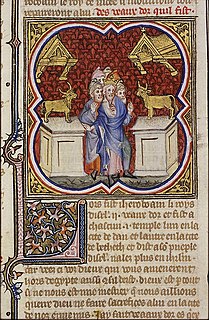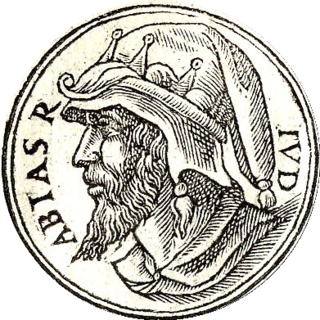Related Research Articles

The Ark of the Covenant, also known as the Ark of the Testimony, and in a few verses across various translations as the Ark of God, is a gold-covered wooden chest with lid cover described in the Book of Exodus as containing the two stone tablets of the Ten Commandments. According to various texts within the Hebrew Bible, it also contained Aaron's rod and a pot of manna. In the Christian New Testament, Hebrews 9:4 reads that "The ark of the covenant [was] covered on all sides with gold, in which was a golden jar holding the manna, and Aaron's rod which budded, and the tablets of the covenant."

The Book of Kings is the ninth book of the Hebrew Bible or the eleventh and twelfth books of the Christian Old Testament. It concludes the Deuteronomistic history, a history of Israel also comprising the books of Joshua and Judges and the Book of Samuel, which biblical commentators believe was written to provide a theological explanation for the destruction of the Kingdom of Judah by Babylon in c. 586 BCE and a foundation for a return from exile. The two books of Kings present a history of ancient Israel and Judah from the death of King David to the release of Jehoiachin from imprisonment in Babylon, a period of some 400 years. Scholars tend to treat the books as made up of a first edition from the late 7th century BCE and a second and final edition from the mid 6th century BCE.

Jeroboam I was the first king of the northern Kingdom of Israel. The Hebrew Bible describes the reign of Jeroboam to have commenced following a revolt of the ten northern Israelite tribes against Rehoboam that put an end to the United Monarchy.

Obadiah is a Biblical theophorical name, meaning "servant or slave of God" or "worshiper of Yahweh." The form of Obadiah's name used in the Septuagint is Obdios. In Latin it is translated as Abdias while in Arabic it is عبداللّٰهʿAbdullah. The Bishops' Bible refers to the prophet as Abdi.

Abijam was, according to the Hebrew Bible, the fourth king of the House of David and the second of the Kingdom of Judah. He was the son of Rehoboam and the grandson of Solomon. The Chronicler refers to him as Abijah.
The non-canonical books referenced in the Bible includes pseudepigrapha, writings from Hellenistic and other non-Biblical cultures, and lost works of known or unknown status. By the "Bible" is meant those books recognised by most Christians and Jews as being part of Old Testament as well as those recognised by Christians alone as being part of the Biblical apocrypha or of the Deuterocanon.
Iddo was a minor biblical prophet. According to the Books of Chronicles, he lived during the reigns of King Solomon and his heirs, Rehoboam and Abijah, in the Kingdom of Judah.
The Book of Nathan the Prophet and the History of Nathan the Prophet are among the lost books of the Tanakh, attributed to the Biblical prophet Nathan. They may be the same text, but they are sometimes distinguished from one another. No such text is found anywhere in the Tanakh, so it is presumed to have been lost or removed from earlier texts.
The Visions of Iddo the Seer is a lost text that was probably written by the biblical prophet Iddo, who lived at the time of Rehoboam. The book is described at 2 Chronicles 9:29:
Now the rest of the acts of Solomon, first and last, are they not written in the book of Nathan the prophet, and in the prophecy of Ahijah the Shilonite, and in the visions of Iddo the seer against Jeroboam the son of Nebat?
The Book of the Kings of Judah and Israel was separated into the two books of I Kings and II Kings in the Old Testament. The book is described at 2 Chronicles 16:11. The passage reads: "And, behold, the acts of Asa, first and last, lo, they are written in the book of the kings of Judah and Israel." It is also referenced at 2 Chronicles 24:27; "The account of his sons, the many prophecies about him, and the record of the restoration of the temple of God are written in the annotations on the book of the kings. And Amaziah his son succeeded him as king."
The [Book of the] Acts of Solomon is a lost text referred to in 1 Kings 11:41, which reads:

Ahijah the Shilonite, was a Levite prophet of Shiloh in the days of Solomon, as mentioned in the Hebrew Bible's First Books of Kings. Ahijah foretold to Jeroboam that he would become king.

In Christianity the figures widely recognised as prophets are those mentioned as such in the Old Testament and the New Testament. It is believed that prophets are chosen and called by God.
In Bible prophecy, several verses relate to the future of the Davidic line. Christians argue that Jesus fulfills these prophecies, while skeptics and Jews disagree.
According to Rashi, there were 48 prophets and 7 prophetesses of Judaism. The last Jewish prophet is believed to have been Malachi. In Jewish tradition it is believed that the period of prophecy, called Nevuah, ended with Haggai, Zechariah, and Malachi at which time the "Holy Spirit departed from Israel".
Isaiah 22 is the twenty-second chapter of the Book of Isaiah in the Hebrew Bible or the Old Testament of the Christian Bible. This book contains the prophecies attributed to the prophet Isaiah, and is one of the Books of the Prophets. This chapter contains a prophecy against "untimely rejoicing in Jerusalem" and "a threefold prediction of Shebna's fall, of Eliakim's elevation, and of Eliakim's fall".

Jeroboam's Revolt was an armed insurrection against Rehoboam, king of the United Monarchy of Israel, and subsequently the Kingdom of Judah, led by Jeroboam in the late 10th century BCE, according to the First Book of Kings and the Second Book of Chronicles of the Hebrew Bible. The conflict, referring to the independence of the Kingdom of Samaria and the subsequent civil war during Jeroboam's rule, began shortly after the death of Solomon and lasted until the Battle of Mount Zemaraim. The conflict began due to discontent under the rule of Solomon's successor, his son Rehoboam, and was waged with the goal of breaking away from the United Monarchy of Israel. Though this goal was achieved very early on in the conflict, the war continued throughout the duration of Rehoboam's reign and well into the reign of his son, Abijam, who defeated the armies of Jeroboam but failed to reunite the kingdoms.
The House of Jeroboam or Jeroboam dynasty was a reigning dynasty of the Kingdom of Israel. They are depicted in the first of the Books of Kings. Their estimated reign is placed in the 10th century BCE.

2 Kings 1 is the first chapter of the second part of the Books of Kings in the Hebrew Bible or the Second Book of Kings in the Old Testament of the Christian Bible. The book is a compilation of various annals recording the acts of the kings of Israel and Judah by a Deuteronomic compiler in the seventh century BCE, with a supplement added in the sixth century BCE. This chapter focuses on the Israel king Ahaziah, the son of Ahab, and the acts of Elijah the prophet who rebuked the king and prophesied the king's death.
References
- ↑ Apologetics Press, Are There Lost Books of the Bible?, accessed 24 April 2020
- ↑ Prince, J. D. and Kohler, J., Ahijah (the prophet), accessed 24 April 2020
| This article about a book related to Christianity is a stub. You can help Wikipedia by expanding it. |
| This article related to the Hebrew Bible is a stub. You can help Wikipedia by expanding it. |